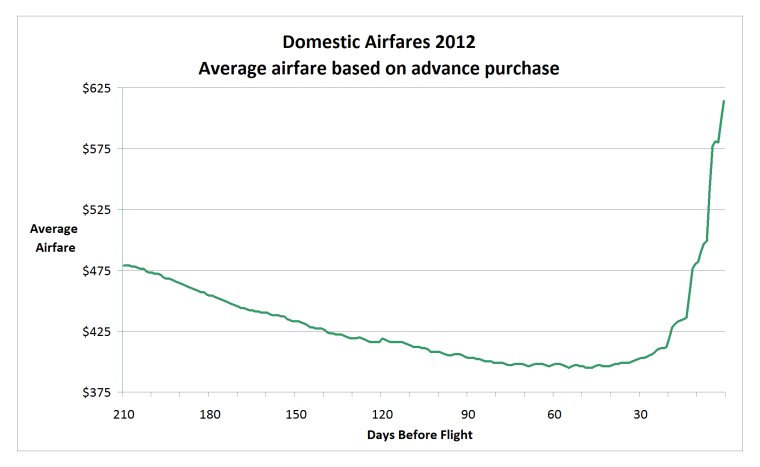If you’ve ever found yourself fretting over how far in advance you should buy plane tickets in order to snag the best deal — and, really, who hasn’t? — you can relax. The airfare geeks at CheapAir.com revealed the answer on Thursday: 49 days if you’re flying domestic; 81 if you’re flying international.

“’When is the best time to buy my ticket?’ is the most frequent question we get,” said CEO Jeff Klee. “We get it constantly.”
To come up with an answer, the company analyzed more than 560 million fare searches conducted over 365 days last year and compared prices from 210 days out (the furthest date for which they had a complete data set) to the day before takeoff.
On average, domestic fares started out relatively high, slipped steadily over the next 23 weeks before bottoming out and remaining fairly steady between seven and four weeks out. Not surprisingly, they spiked dramatically after that and skyrocketed a week before departure.
The key word, of course, is “average,” as Klee would be the first to admit that there are simply too many variables to generate a single, all-encompassing number to cover all situations.
“The reality is that when you dive into the numbers, you realize that it varies so much on the exact date and the exact market,” he told NBC News. “We found cases where the best day to buy was 331 days out, the earliest day you can usually buy a ticket, and we even found scenarios where the day before a flight was the best.”
In fact, dates and markets are only two of the many variables that influence airfares.
“The airlines set fares based on several different categories, including location, season, how much to allot for high-value business travelers and how much to allot for leisure travelers,” said Allison O’Neill, vice president, passenger solutions for SITA, which provides fare-distribution services to the industry. “The airlines deploy revenue-management practices that allow them to look at all those factors in real time and potentially adjust their fares up until the time of flight.”
In other words, as they like to say on Wall Street, past performance is no guarantee of future results.
Still, the study offers food for thought on other aspects of what passes for industry wisdom. According to Klee, the research debunks the belief held by many that the best days to buy are Tuesday and Wednesday because those are the days that airlines typically announce their sales.
“A lot of times, those fares are only available for a handful of dates,” said Klee, “but when people are actually looking for fares on the dates they want to fly, the Tuesday/Wednesday thing doesn’t hold up. If you look at tickets bought on all days of the week, there was only about a $5 difference among them.”
Put it all together and it’s not surprising that Klee sees the study’s findings more as guidelines than rules to live by.
“We’re not telling people to figure out when you’re going to fly, then go back seven weeks and buy your ticket on that day, no questions asked,” he said. “What we recommend is that as soon as you know your trip, start checking fares as early as possible and check them repeatedly. You’ll get a good sense of what fares typically are and you’ll know when you see a good deal.”
Who knows, if you’re planning on flying on March 7, that deal could even show up today.
Rob Lovitt is a longtime travel writer who still believes the journey is as important as the destination. Follow him at Twitter.